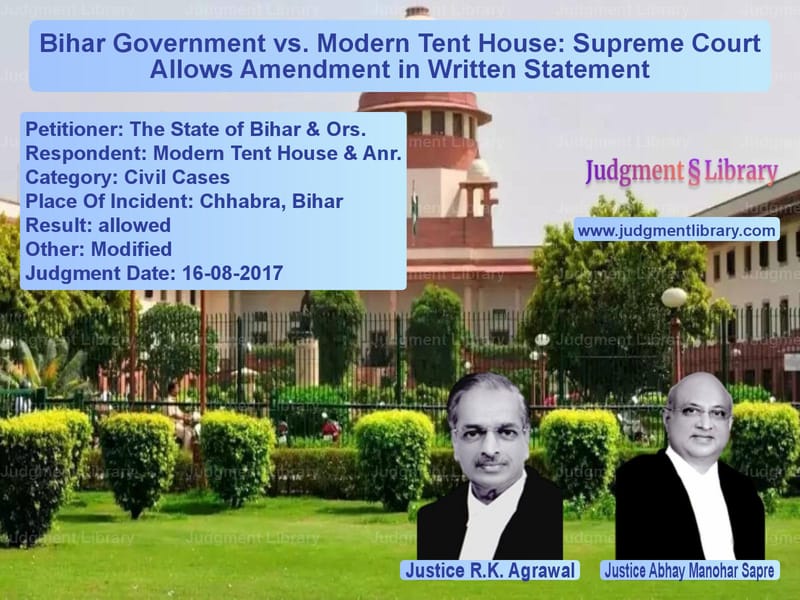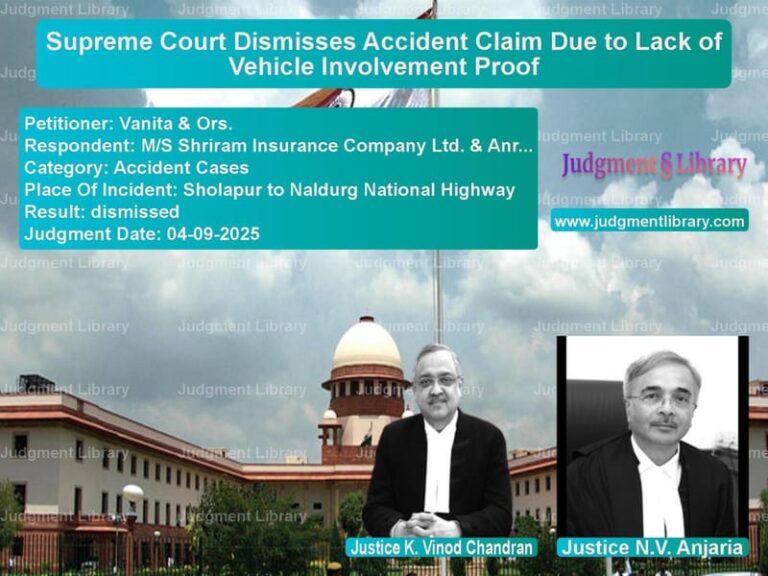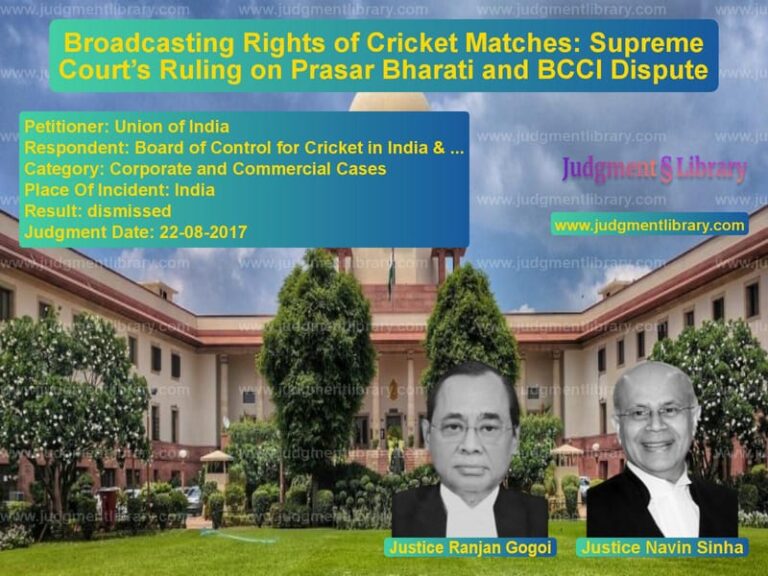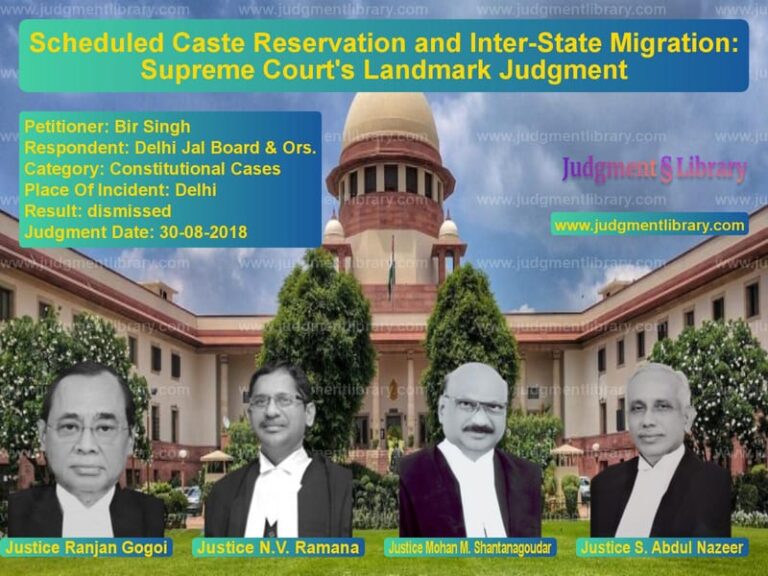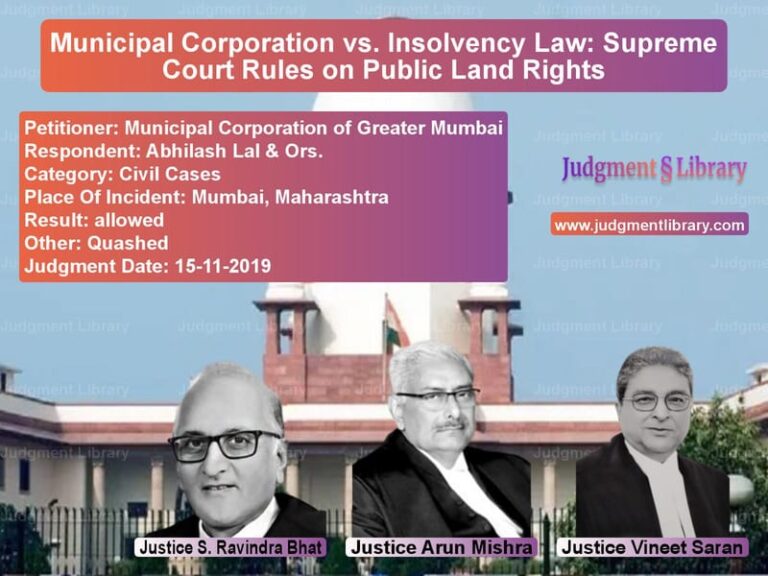Bihar Government vs. Modern Tent House: Supreme Court Allows Amendment in Written Statement
The case of The State of Bihar & Ors. vs. Modern Tent House & Anr. revolved around a civil suit where the appellants (State of Bihar) sought an amendment in their written statement. The Supreme Court had to decide whether the amendment should be permitted despite the trial already being in progress.
Background of the Case
The respondents, Modern Tent House, had filed a money suit (Suit No. 28 of 2002) in the Sub-Judge-1 Court, Chhabra, against the appellants for the recovery of Rs. 41,59,418. The State of Bihar, in their written statement, denied the claims made by the respondents and joined issues on facts. The suit proceeded to trial, and the respondents had completed their evidence, leaving the appellants’ evidence yet to be recorded.
At this stage, the appellants filed an application under Order 6 Rule 17 of the Civil Procedure Code (CPC) seeking to amend their written statement by adding two paragraphs. The respondents opposed this application.
Arguments Presented
Appellants’ Arguments (State of Bihar)
The appellants contended that:
- The amendment sought to elaborate on the facts already pleaded in the written statement.
- It was not introducing a new defense but merely amplifying the existing arguments.
- The amendment would not change the original defense or withdraw any admission made earlier.
- The respondents would not suffer any prejudice as they still bore the burden of proving their claims.
- Since the trial was still ongoing and the evidence of the appellants had not yet begun, the amendment should be allowed in the interest of justice.
Respondents’ Arguments (Modern Tent House)
The respondents opposed the amendment, arguing that:
- The appellants had ample time to present their defense earlier and should not be allowed to change their position at this stage.
- Allowing the amendment would cause unnecessary delays and complications in the trial.
- The request for amendment was an attempt to evade liability rather than a genuine need for clarification.
Supreme Court’s Observations
The Supreme Court critically analyzed the nature of the amendment and made the following observations:
“Firstly, the proposed amendment is on facts and the appellants in substance seek to elaborate the facts originally pleaded in the written statement.”
The Court further noted that:
“It is in the nature of amplification of the defense already taken; it does not introduce any new defense compared to what has originally been pleaded in the written statement.”
Regarding whether the amendment would change the nature of the defense, the Court clarified:
“If allowed, it would neither result in changing the defense already taken nor will result in withdrawing any kind of admission, if made in the written statement.”
Since the evidence of the defendants had not yet commenced, the Court found that there was no prejudice to the plaintiffs. The Court emphasized:
“Since the trial is not yet completed, it is in the interest of justice that the proposed amendment of the defendants should have been allowed by the Courts below rather than to allow the defendants to raise such plea at the appellate stage, if occasion so arises.”
Final Judgment
The Supreme Court allowed the appeal and set aside the orders of the lower courts. The Court ruled that:
- The application for amendment filed by the appellants under Order 6 Rule 17 CPC was allowed.
- The appellants were permitted to amend their written statement and incorporate the additional paragraphs.
- The respondents were given an opportunity to amend their plaint and submit additional evidence, if necessary.
- The trial court was directed to ensure the suit’s expeditious disposal within six months.
- The parties were instructed to appear before the trial court on September 4, 2017.
The Supreme Court concluded:
“The respondents (plaintiffs) are also given an opportunity to amend their plaint and adduce any further evidence, if they so desire before defendants are called upon to adduce their evidence.”
Implications of the Judgment
This ruling has significant implications for civil litigation, particularly concerning amendments to written statements:
- It reaffirms that amendments can be permitted even at advanced stages of trial if they do not introduce entirely new defenses.
- The judgment upholds the principle that procedural laws should facilitate justice rather than be used as technical barriers.
- It establishes that courts should consider amendments favorably when they serve the interest of justice and do not prejudice the opposing party.
- The ruling prevents defendants from being unfairly restricted in presenting their defense, ensuring that all material facts are brought before the court.
Conclusion
The Supreme Court’s decision in this case provides a clear precedent on the issue of amending written statements during an ongoing trial. By allowing the amendment, the Court ensured that the State of Bihar could present its full defense without causing undue prejudice to the plaintiffs. The ruling underscores the judiciary’s commitment to delivering fair and complete justice, even if it requires procedural adjustments during trial proceedings.
Don’t miss out on the full details! Download the complete judgment in PDF format below and gain valuable insights instantly!
Download Judgment: The State of Bihar & vs Modern Tent House & Supreme Court of India Judgment Dated 16-08-2017.pdf
Direct Downlaod Judgment: Direct downlaod this Judgment
See all petitions in Contract Disputes
See all petitions in Damages and Compensation
See all petitions in Specific Performance
See all petitions in Judgment by R K Agrawal
See all petitions in Judgment by Abhay Manohar Sapre
See all petitions in allowed
See all petitions in Modified
See all petitions in supreme court of India judgments August 2017
See all petitions in 2017 judgments
See all posts in Civil Cases Category
See all allowed petitions in Civil Cases Category
See all Dismissed petitions in Civil Cases Category
See all partially allowed petitions in Civil Cases Category

